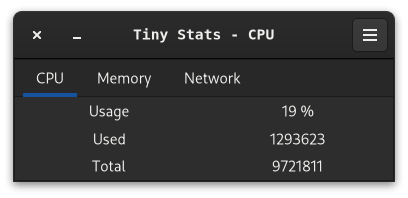Code
Dependencies
We need the following:
gtk4.crhardwarenon-blocking-spawngettext.cr
dependencies:
gtk4:
github: hugopl/gtk4.cr
hardware:
github: crystal-community/hardware
non-blocking-spawn:
github: GeopJr/non-blocking-spawn
gettext:
github: GeopJr/gettext.crsrc/modules/prerequisites.cr
For now, we need to gather the app version from shard.yml and load the UI & CSS files as strings using macros.
These will later be replaced with GResource.
module Tiny::Stats
extend self
VERSION = {{read_file("./shard.yml").split("version: ")[1].split("\n")[0]}}
UI = {{read_file("./data/ui/app.ui")}}
CSS_STRING = {{read_file("./data/css/style.css")}}
endsrc/tiny-stats.cr (main file)
This is responsible for the load order and for loading dependencies. However it can still be used for code that will run after the other files.
We create a new Builder using the UI global variable from prerequisites, a new CssProvider and a new Application.
Since we assigned IDs to the widgets we are going to need, we can assign them to global vars for easy access later on by down-casting.
require "gtk4"
require "hardware"
require "non-blocking-spawn"
require "./modules/prerequisites.cr" # You can also just place the contents of it here,
# just make sure it's above the code below
require "./modules/functions/*"
require "./modules/views/*"
module Tiny::Stats
B_UI = Gtk::Builder.new_from_string(UI, UI.bytesize.to_i64)
CSS = Gtk::CssProvider.new
NOTEBOOK = Gtk::Notebook.cast(B_UI["tinyNotebook"])
MENU_BTN = Gtk::MenuButton.cast(B_UI["tinyMenu"])
CPU_GRID = Gtk::Grid.cast(B_UI["tinyCPU"])
MEMORY_AVAILABLE = Gtk::Label.cast(B_UI["tinyAvailable"])
MEMORY_USED = Gtk::Label.cast(B_UI["tinyUsed"])
MEMORY_TOTAL = Gtk::Label.cast(B_UI["tinyTotal"])
NET_UP = Gtk::Label.cast(B_UI["tinyUp"])
NET_DOWN = Gtk::Label.cast(B_UI["tinyDown"])
CPU_USAGE = Gtk::Label.cast(B_UI["tinyCPUUsage"])
CPU_USED = Gtk::Label.cast(B_UI["tinyCPUUsed"])
CPU_TOTAL = Gtk::Label.cast(B_UI["tinyCPUTotal"])
APP = Gtk::Application.new("dev.geopjr.tinystats", Gio::ApplicationFlags::None)
endsrc/modules/functions/meters.cr
We want to update the hardware stats in an infinite loop. To achieve this we are going to spawn a fiber (with the parallelism flag) that updates the labels (using the global vars from before) every second.
We also want it to start on demand, so we are going to wrap it in a method inside a new module.
module Tiny::Stats
module Meters
extend self
def init
Non::Blocking.spawn do
old_in, old_out = 0.0, 0.0
cpus = Hardware::CPU.new
loop do
memory = Hardware::Memory.new
net = Hardware::Net.new
MEMORY_USED.text = "#{(memory.used/1024).to_i64} mb"
MEMORY_AVAILABLE.text = "#{(memory.available/1024).to_i64} mb"
MEMORY_TOTAL.text = "#{(memory.total/1024).to_i64} mb"
now_in, now_out = net.in_octets, net.out_octets
NET_DOWN.text = "#{(now_in - old_in) / 1000} kB/s"
NET_UP.text = "#{(now_out - old_out) / 1000} kB/s"
old_in, old_out = now_in, now_out
CPU_USAGE.text = "#{cpus.usage!.to_i64} %"
CPU_USED.text = "#{cpus.used}"
CPU_TOTAL.text = "#{cpus.total}"
sleep 1.second
end
end
end
end
endsrc/modules/functions/about_action.cr
Similarly, let's also create the "About app" action.
We need to create a new Gio#SimpleAction with the name of the action we set in the UI file:
<attribute name="action">app.about</attribute> => about
Then we add it to the Gtk::Application and handle its activate_signal.
module Tiny::Stats
extend self
def about_action(app : Gtk::Application)
action = Gio::SimpleAction.new("about", nil)
app.add_action(action)
action.activate_signal.connect do
Gtk.show_about_dialog(
APP.active_window,
name: "About Tiny Stats",
application: APP,
program_name: "Tiny Stats",
version: VERSION,
logo_icon_name: "dev.geopjr.tinystats",
copyright: "© 2021 Evangelos Paterakis",
website: "https://github.com/GeopJr/tiny-stats-template",
authors: ["Evangelos \"GeopJr\" Paterakis"],
artists: ["Evangelos \"GeopJr\" Paterakis"],
)
end
end
endsrc/modules/views/main.cr
Since our app is very simple and has only one view, we'll glue everything together here.
We'll connect to the startup and activate signals. The startup signal will be used to load the CSS:
def startup(app : Gtk::Application)
CSS.load_from_data(CSS_STRING.bytes)
endThe activate signal emits every time your app launches, this means that it can emit multiple times. We wan't to avoid that with tiny stats and instead just focus the window if it's already running.
We also want the window title to change based on the Notebook page title. We can do so by connecting to the switch_page_signal and get the current page title using Gtk::Notebook#tab_label_text:
NOTEBOOK.switch_page_signal.connect do |x|
window.title = "Tiny Stats - #{NOTEBOOK.tab_label_text(x)}"
endWe will also initialize the above mentioned functions:
Tiny::Stats::Meters.init
Tiny::Stats.about_action(app)Let's also make Crystal exit when the app closes:
exit(APP.run(ARGV))The finished file should be:
module Tiny::Stats
@@main_window_id = 0_u32
def startup(app : Gtk::Application)
CSS.load_from_data(CSS_STRING.bytes)
end
def activate(app : Gtk::Application)
main_window = APP.window_by_id(@@main_window_id)
return main_window.present if main_window
window = Gtk::ApplicationWindow.cast(B_UI["tinyWindow"])
window.application = app
window.title = "Tiny Stats - CPU"
@@main_window_id = window.id
Tiny::Stats::Meters.init
Tiny::Stats.about_action(app)
NOTEBOOK.switch_page_signal.connect do |x|
window.title = "Tiny Stats - #{NOTEBOOK.tab_label_text(x)}"
end
Gtk::StyleContext.add_provider_for_display(window.display, CSS, Gtk::STYLE_PROVIDER_PRIORITY_APPLICATION.to_u32)
window.present
end
APP.startup_signal.connect(->startup(Gtk::Application))
APP.activate_signal.connect(->activate(Gtk::Application))
exit(APP.run(ARGV))
endIt should now be runnable:
$ crystal run src/tiny-stats.cr -Dpreview_mt